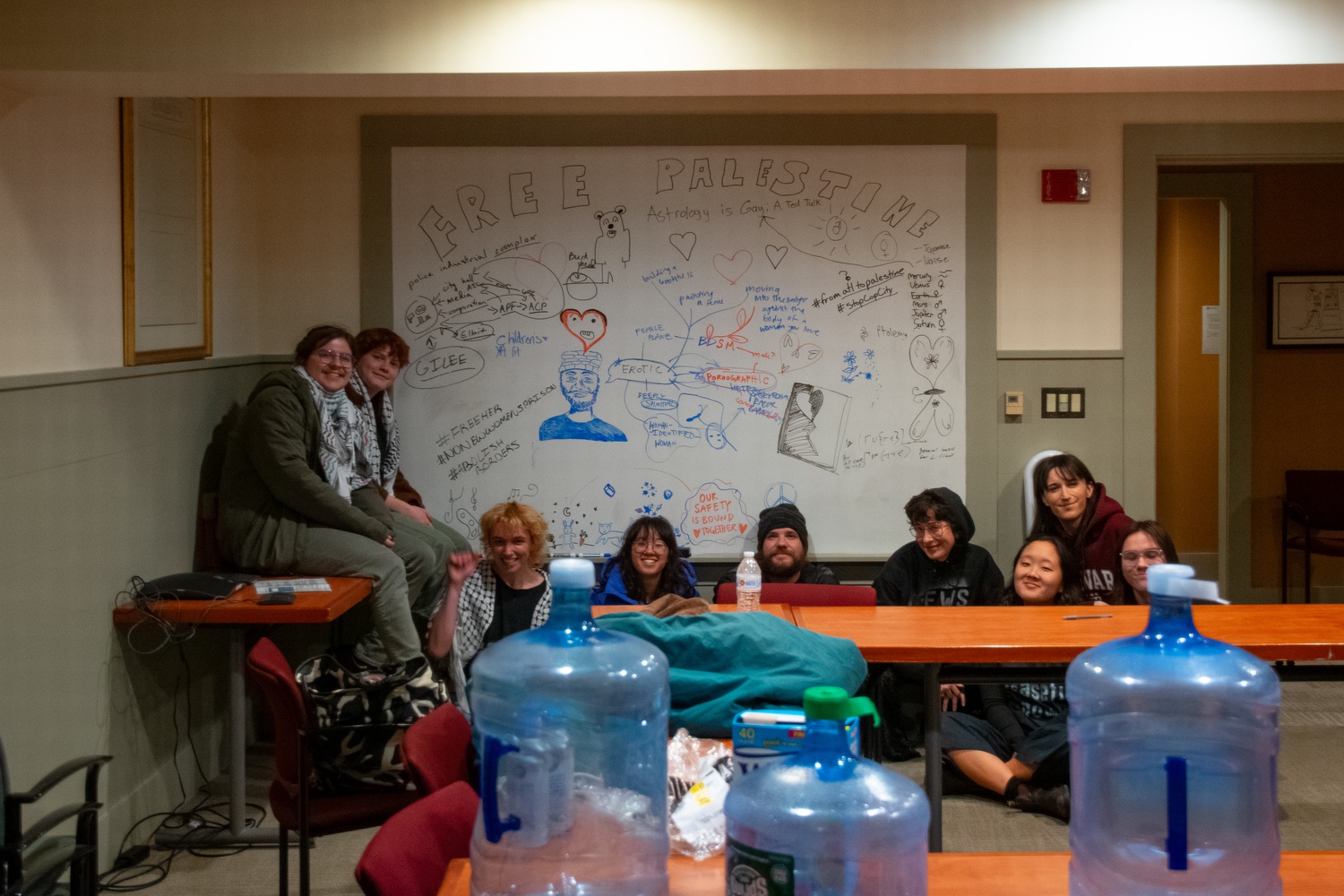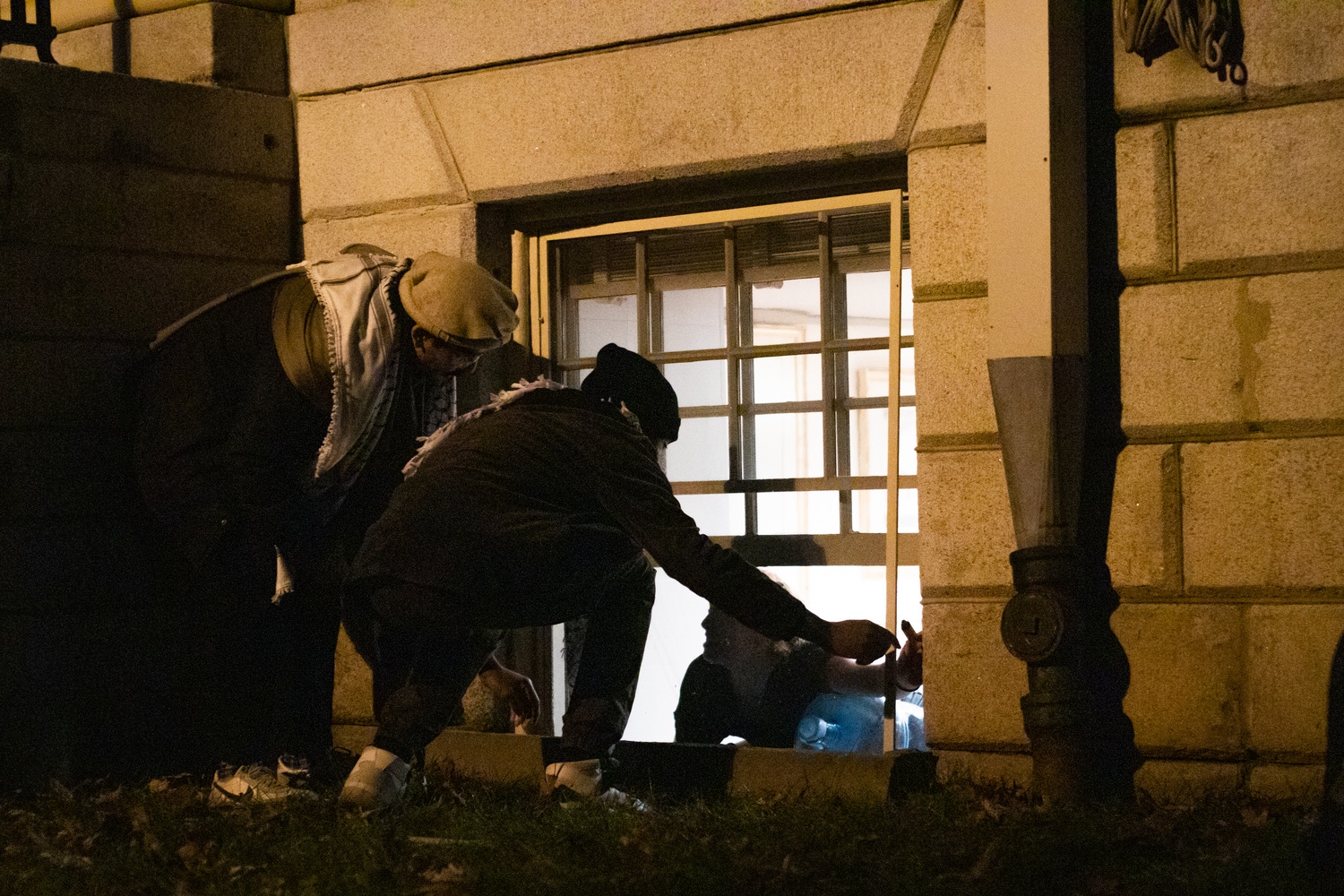
News
Summers Will Not Finish Semester of Teaching as Harvard Investigates Epstein Ties

News
Harvard College Students Report Favoring Divestment from Israel in HUA Survey

News
‘He Should Resign’: Harvard Undergrads Take Hard Line Against Summers Over Epstein Scandal

News
Harvard To Launch New Investigation Into Epstein’s Ties to Summers, Other University Affiliates

News
Harvard Students To Vote on Divestment From Israel in Inaugural HUA Election Survey
University Hall Occupied By Harvard Jews For Palestine, Group Demanding Ceasefire in Israel-Hamas War

Updated: November 17, 2023, at 3:03 p.m.
The occupation of University Hall by nine pro-Palestine student organizers will continue through the night, a student protester announced late Thursday evening, after Harvard College Dean Rakesh Khurana gave them the opportunity to leave without disciplinary consequences.
Maya M.F. Wilson ’24, a Crimson Magazine editor and one of the students in University Hall, said Khurana spoke to the protesters just before 11 p.m. and offered them the chance to leave without facing the Administrative Board, the body that handles disciplinary action against students.
According to Wilson, the protesters gave Khurana three conditions to end the occupation: a written response to the students’ demands, a meeting with University President Claudine Gay, and a guarantee that the students would not be disciplined by the Ad Board.
Khurana said he could not accept the offer, Wilson said.
College spokesperson Jonathan Palumbo declined to comment, writing that conversations between Khurana and students were confidential. He declined to say whether the students would face disciplinary action.
As of early Friday morning, the students remained in the basement of University Hall, with no indication that they planned to depart willingly. Though police officers in the building spoke with protesters and scanned their Harvard IDs around 5 p.m., no students were arrested as of early Friday morning.
“What did we come here for? We came here to get fucking arrested or Ad-Boarded if our demands weren’t met,” one of the protesters occupying University Hall said in a speech through the basement window late Thursday night.

The group’s demands include an immediate call by Harvard’s administration for a ceasefire, greater administrative support for pro-Palestine student organizers — including through the creation of an investigative committee on Islamophobia, anti-Palestinian racism, and suppression of pro-Palestine speech — and a University statement asserting that anti-Zionism and antisemitism are not the same.
Around 12:30 p.m. Thursday, Julia K. Pastreich ’25, a member of Harvard Jews for Palestine, said the group plans on occupying University Hall until the demands are met.
“We’re here to show there is anti-Zionist and non-Zionist Jewish presence on campus, and that’s not being represented by the administration right now,” Pastreich said. “We’re here to stand in solidarity with all the student organizers in PSC and other organizations.”
“We will see how the police responds and how the University responds,” she added.
University officials and Harvard University Police Department had initially refused to allow supporters to enter the building or bring them food. But at 9 p.m., Adams House Faculty Dean Salmaan Keshavjee brought burritos to the students. Earlier, Khurana had provided the demonstrators with Twizzlers.
Around 11 p.m., after organizers said Khurana rejected their offer to leave, students remaining in the basement and other organizers outside dislodged a window screen to pass through food and personal items. The window screen had already had a slight gap.

The demonstration began at around 11 a.m., prompting HUPD to restrict access to the building and tighten security around the Yard throughout the day.
The students, who numbered roughly a dozen at the beginning of the sit-in, were affiliated with Harvard Jews for Palestine, an unrecognized student group at the College advocating for a ceasefire in the Israel-Hamas war. Members “stand in solidarity with Palestine” and “echo the demands of pro-Palestinian movements demanding justice,” according to the group’s Instagram account.
An email sent to University Hall staff at 11:22 a.m. from Evren Celimli, an area manager at the Faculty of Arts and Sciences Office of Physical Resources and Planning, said HUPD officers had arrived on the scene and the doors to the building were locked. At 11:40, he sent a follow-up advising staff to work outside the building for the rest of the day.
At around 12:30 p.m., more than 20 people gathered in front of University Hall — which houses the offices of top Faculty of Arts and Sciences and College administrators — to support the occupying students in a rally. Students inside the building banged on the lower level windows of the building, chanting “Let them in.”
Roughly 45 minutes later, at 1:15 p.m., dozens of protesters from a separate demonstration at Harvard Law School joined the protest outside University Hall.
Around six HUPD officers and a few Securitas officers were stationed at the four entrances to the building around noon on Thursday, informing students — and visitors hoping to attend an afternoon concert in the building — that they were not permitted to enter.

More than 100 students and affiliates returned to the John Harvard statue around 4:30 p.m. for a second rally in support of the students inside the building.
Several Jewish and Palestinian students and campus organizers spoke at the rally, as did History professor Walter Johnson, who also signed a faculty open letter to Gay early this week criticizing her condemnation of the pro-Palestine protest chant “from the river to the sea.”
“You have known for a long time that the words ‘free speech’ have never meant free speech about Palestine,” Johnson said. “The field of debate over ‘free speech’ in our universities has always been dependent upon an elision of Palestine.”
HUPD spokesperson Steven G. Catalano did not respond to multiple requests for comment. University spokesperson Jonathan L. Swain declined to comment on the students’ calls for a ceasefire.
The occupation by Harvard Jews for Palestine is the latest in a series of student demonstrations demanding an end to violence in Gaza. Last month, more than 1,000 protesters rallied in Harvard Yard calling for an end to the war. The University has faced intense backlash from donors and alumni over pro-Palestine activism on campus, including over a confrontation at an Oct. 18 “die-in” protest at the Business School.
University Hall has long been a target of student activists during campus protests. Earlier this year, dozens of students occupied the building in protest of Harvard’s continued employment of African and African American Studies and Anthropology professor John L. Comaroff.
In 1969, several hundred students took over University Hall in protest of the Vietnam War, a demonstration that led to between 250 and 300 arrests.
—Crimson staff writers Michelle N. Amponsah, J. Sellers Hill, Julian J. Giordano, Miles J. Herszenhorn, Nia L. Orakwue, and Neil H. Shah contributed reporting.
—Staff writer Cam E. Kettles can be reached at cam.kettles@thecrimson.com. Follow her on Twitter @cam_kettles.
—Staff writer Elias J. Schisgall can be reached at elias.schisgall@thecrimson.com. Follow him on X @eschisgall.
Want to keep up with breaking news? Subscribe to our email newsletter.
